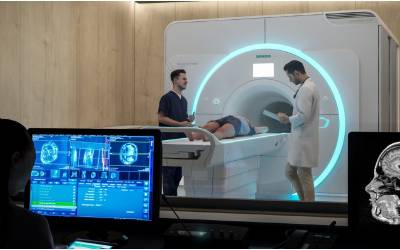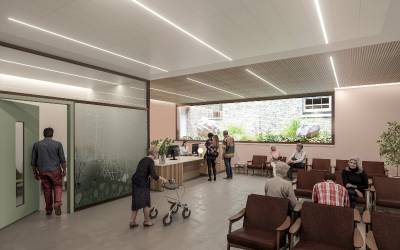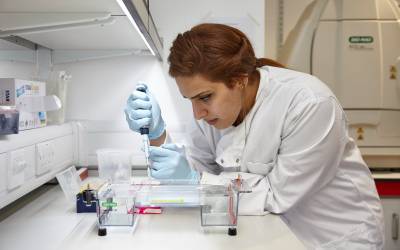Our Vision
Innovation
Innovating to create a better future

We are investing in high performance laboratory equipment and services including innovative core technology platforms and services. By equipping the next generation of scientists, we can dramatically improve patient treatments to tackle the devastating global health challenge of neurological diseases and revolutionise 21st century healthcare.
Partnership
Researchers, clinicians and patients under one roof

Already working in close proximity at the Queen Square hub, where the UCLH National Hospital for Neurology and Neurosurgery’s (NHNN) existing inpatient wards, day care, operating theatres and intensive care units sit side-by-side with scientists at Queen Square House, the new facility at Grays Inn Road will build on this approach, providing 22 new outpatient rooms for NHNN and a joint UCL and UCLH MRI facility with the capacity for six MRI scanners for both clinical and research use, significantly increasing the number of scanners available to the NHS.
The outpatient unit will provide clinical care for individuals with a whole range of neurological conditions such as stroke; dementia; epilepsy; movement disorders; and genetic, inflammatory and degenerative conditions affecting the brain, spinal cord, peripheral nerves and muscles, neurological research can be better geared towards patients’ needs, and advances in clinical practice can happen with little delay.
Collaboration
Working together to tackle neurological disease

Shared flexible space, central equipment and services are fundamental in this vision, making major advances possible for the whole scientific community. Reconfigurable laboratories that adapt to evolving research techniques encourage collaboration and will support future generations in developing breakthrough cures.
A joint endeavour, we are strengthening our partnerships to bring together world-leading expertise and offer unrivalled opportunities for multidisciplinary collaboration across both our centres at 256 Grays Inn Road and Queen Square.
The UCL Queen Square Institute of Neurology, with the UK DRI and its national network of centres and UCLH National Hospital for Neurology and Neurosurgery (NHNN), has partnered with charities like Alzheimer’s Society and Alzheimer’s Research UK, alongside government, the Medical Research Council and the NHS.
Our research focus

Basic research (gathering important information about neurological diseases), clinical research, where patients participate in research programmes) and translational research (linking basic and clinical research to deliver novel treatments for these disorders) will be carried out by leading scientists from around the world, in collaboration with NHS clinicians and PhD students.
Research will focus on neurological diseases such as dementia, Alzheimer’s disease, multiple sclerosis, Huntington’s disease, neuromuscular diseases, Parkinson’s disease, motor neuron diseases, stroke and epilepsy.
The outpatient clinic will have dedicated areas where patients and their families and friends can interact directly with clinical researchers, to learn what studies are available and what they entail, and to give informed consent to participate in ongoing research programmes and projects.
Vimeo Widget Placeholderhttps://vimeo.com/338873307
 Close
Close


